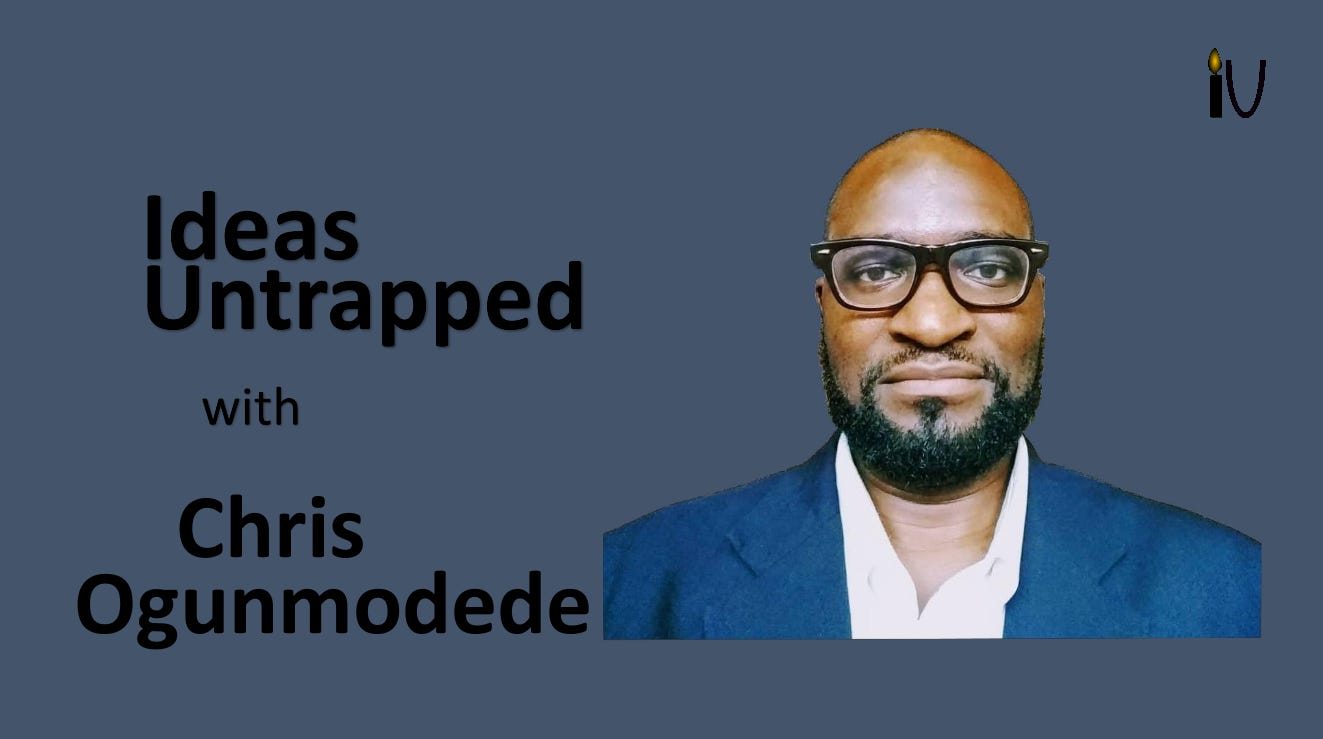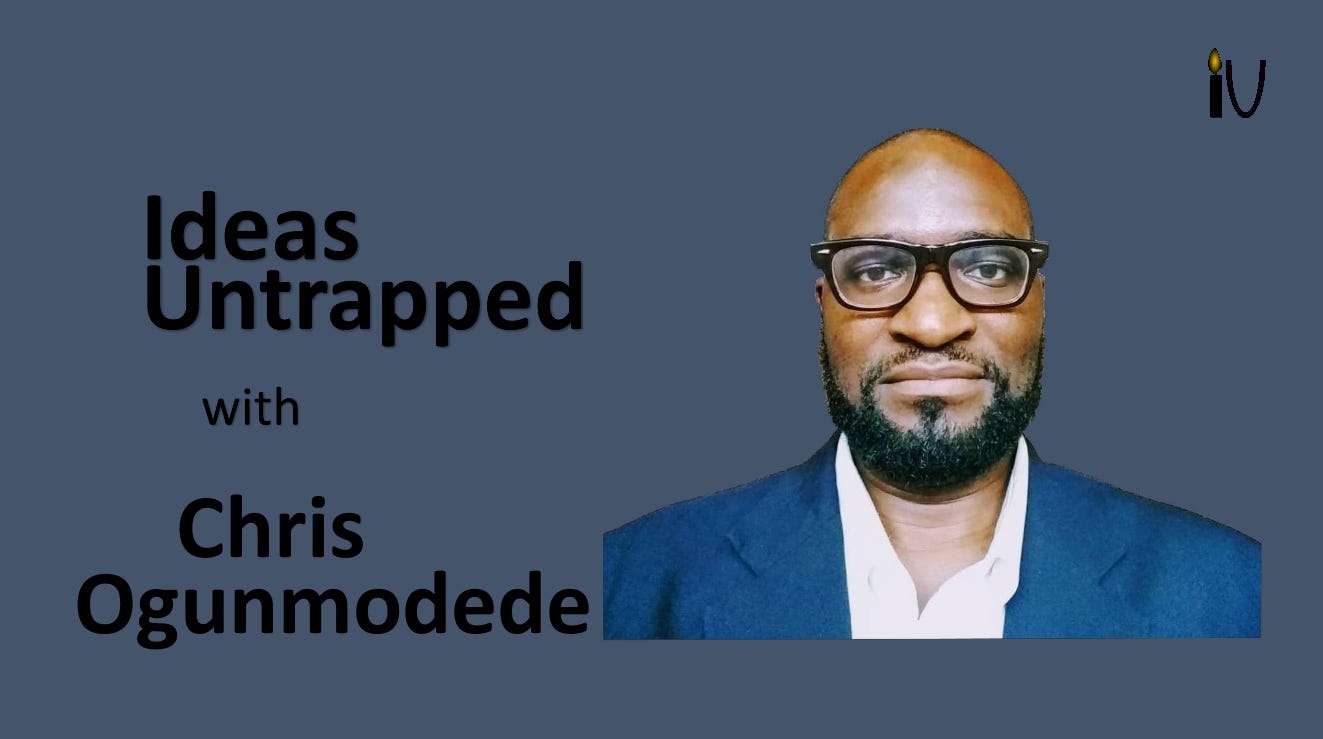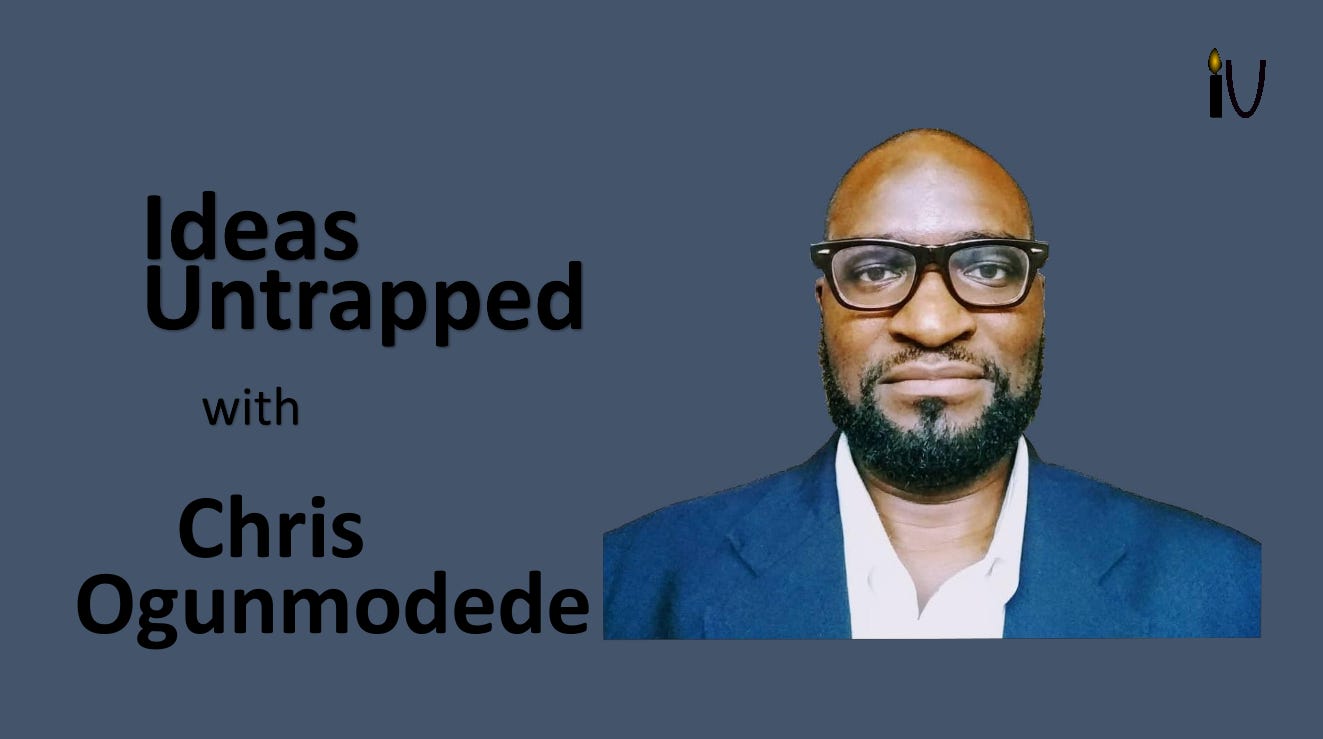I have long admired the thoughts of foreign policy analyst Chris Ogunmodede through his Twitter feed, and it was a pleasure having this conversation with him. Our jump-off point was the tragic fallout from the EndSars protests. Chris’ knowledge and grasp of the core issues ensured he had deep insights on all my questions. (P.S he had some fun bashing economists).
You can rate us here. If you want to support our efforts in bringing you the thoughts of brilliant thinkers through these conversations, you can be a patron here.
Transcript
TL: This Ideas Untrapped and my guest today is Chris Olaoluwa Ogunmodede. He is a foreign policy analyst, a writer, editor and political risk consultant. His work centers on political institutions and foreign policy of African countries, particularly the West African region, and he has extensive experience working across Africa, Europe, and the United States. He's an editor at the Republic, a Pan-African global affairs publication. You're welcome, Chris, it's a pleasure to have you here.
CO: It's a pleasure, thanks so much for having me on your podcast. I'm glad to be here.
TL: We cannot really avoid the events of the last couple of weeks with the EndSARS protest and some of the tragic turn that things have taken since that very momentous period in the history of the country, so I think where I would like to start interrogating the issues is about the Nigerian security force, generally, not just the police. Because we know and as things turned out with the confrontation of the army with the protesters that the issue of abuse, extrajudicial killing and basically the overuse and exercise of power is symptomatic of our security force.
So I want to know, what do you think are the underlying issues that makes this such a systemic problem and that makes it so very difficult to solve? So there are two views I've encountered in talking about this. One is about colonialism, so I want to ask you - how much influence do you think the colonial establishment and governance has on our institutions? Is it still a relevant factor? Should we still keep using that framework and analysis in looking at our institutions today?
CO: That's a very good question and, you know, that's a very relevant question. I would say that the legacy of Nigeria's security forces are bound up in the colonial experience in the sense that the security forces, whether it's the police [or] the armed forces were created to repress local populations, to put down resistance movements, whether they were anti-tax ones, whether they were ones pushing for women's rights, you know, native rule, things like that. That is the contextual emergence from which modern Nigerian policing and the armed forces broadly, as you pointed out this is a problem that straddles across the security services, not just the police. And that's where [the] police, the army and other security elements of Nigerian society have emerged from: the suppression of popular expression of dissent.
Essentially what you had was the colonial authorities, when they departed, post independence, they were essentially replaced by a new class of elites who frankly were happy to pick up the baton from the colonial authorities because they too had a stake in continuing this repressive practices and you can still see many of these elements around Nigerian society. For example, loitering as a crime in Nigeria is something that came from the colonial experience where if you were seen to be in a neighborhood you weren't supposed to be in, you would be arrested or taken away. That's still happening in many parts of Lagos and other cities in Nigeria. If you look like you don't belong in a neighborhood, you will attract the attention of the police. It's like when you listen to some stories about SARS for example, they look at you as a young person driving a nice car, you look a certain way, in a certain neighborhood. Again, all of this is part of a legacy of oppression that has been passed down from that colonial heritage.
Now, this is not to say that the current elites, "post colonial elites" don't have any agency their own, but institutional change is harder than it sounds. You know, it's hard to get rid of bad habits. Old habits die hard. And once there hasn't been a social contract between constituent and authority in the sense that as soon as Nigeria got it's independence, it became a republic [in] 1963 and then the military took over in '66 and essentially we have been living through a militarised society, practically speaking since 1966. Yes, there was the transition to the second republic and that collapsed, and you had the third republic and that collapsed. Now we have the fourth republic. But fundamentally Nigeria's context has been one, at least post-1966, has been one of that same structure of violence and abuse.
Unless you have a proper social contract between the citizen and the state regarding what kind of policing do they want? What kind of law enforcement do they want? What kind of national security policies do they want? And these things have to be reflected, not just in the Constitution, but in the way individuals relate with themselves in their neighborhoods, with the way the political class relates with voters. As long as that doesn't exist, that colonial legacy of policing will continue to manifest itself regardless of the fact that we are continuing, of course, to go farther and farther of colonial experience, but those underpinnings of the colonial state haven't been removed and the only way to remove them is by underwriting a social contract between constituent and authority.
TL: It's interesting you talked about social contract because it's something I've also been thinking about in relation to a lot of these issues. I know you hinted at that, but is that really part of the problem that we are seeing here in terms of the relation between the citizens and the security forces? For example, the policeman's job leans more towards the protection of the regime or the people in power, as opposed to the protection and security of the public. And this relationship exist despite what the Constitution says, despite what rights we think we have and things like that, such that the police are basically an instrument of power or the expression thereof.
So how does social contract become part of the social cognition of a population?
CO: That's a very excellent question and frankly it's not one that there are obvious answers for, but I will certainly try to give my own take. First of all, when you look at the way a Constitution is written, there are many ways to do this - you could have a constitutional conference, you could have a constitutional convention, you could have a constituent assembly, so many countries have various iterations of the process by which they arrive at what they would regard as a Constitution that governs the social, legal and political interaction between the citizen and state. In Nigeria's case, to the extent that we have ever done that, it hasn't been very well considerate of all of the factors of society. In the sense that, Nigeria's Constitution whether it's 1979, whether it's 1999 Constitution, first of all, has often been written in secret. Not secret in the sense of being shot somewhere, but the consultation between these various elements of society has not been there. You know, you think of the fact that the '99 Constitution itself was, in large part, based on the conclusions of the Abacha constitutional conference understudied in '94 and they finished it in '95 where Abacha essentially handpicked a bunch of people who he wanted to draw a Constitution that was favourable to the armed forces.
So this is the kind of thing I'm referring to. If that is the way you arrive at a Constitution, then it stands to reason that the old order, the order that protects the status quo, is what you're going to get. Now, on the flip side, you look at Chile. They recently had a vote to overturn the Pinochet Constitution - Augusto Pinochet was the military dictator in Chile. This was a process that the Chilean left in particular who opposed Pinochet, it's something they've been fighting on for decades. There have lots of debate as to whether they were going to having consultative assembly and things of that nature, a constitutional conference. In any case, because the recognition was that that Constitution was not written with the will and consent of the Chilean people, as they wanted a constitution to be written. You cannot have such a Constitution continue to govern a democracy. So Chile transitioned to a democracy in 19...there was a plebiscite in '88 and the president took office in 1990, then Pinochet stepped aside. But the Pinochet Constitution remained there. So there was the recognition for that democratic transition to come full circle, you have to get rid of that Constitution because that Constitution protects so much of the political order Pinochet has created that even though Chile has been a democracy for 30 years now, it's still very much an authoritarian construct.
So bringing it back to Nigeria, that's precisely what I'm getting at, that until you have an understanding of a Constitution as Nigerians collectively want it, if it's a constitution that was written or reflects a previous era where there wasn't a broad-based consultation of people, the kind of social contract that you want to write to reflect in that Constitution is not going to be there. So if you, for example, want police reform and what that would look like in the Nigerian Constitution where some of the things you favour, including state police, boards of arbitration, an independent investigative panel to look at SARS and things like that, then if you want those things to reflect in the Nigerian Constitution, you have got to consult with all the elements of society to see what their views are about that.
Has happens at the moment, the Nigerian Constitution creates a federalized police. So those reforms that you might want, at least if you favour that kind of reform where you have a more decentralized police force, you're simply not going to get it. And you are not going to get at the kind of social contract between citizen and state where the police force is accountable to your governor, in your state, as opposed to your president in Abuja. I mean, imagine if you live in Cross River and you are the victim of SARS brutality. OK, yes, now there's the state panels and all of that. But until those state panel, what was your way of getting accountability? You had to go all the way to the Nigerian police force. Of course, this was when FSARS was still the structure, later on they brought them to the police command, but in reality, because the Nigerian police force is a federalized structure, you have to go all the way to Abuja to get any sort of restitution for yourself.
So if you want a social contract reflecting local accountability in policing, you have got to consult with other elements of society who share those views with you and this is where a responsible, robust civil society could come in. In a society like Chile, the ability to get rid of that Constitution, the Pinochet Constitution, was because several elements of civil society were able to rally themselves together and to create enough of the critical mass to put pressure on the political system to make that a salient issue. Thus far in Nigeria, we've been unable to do that. There are lots of organizations out there doing lots of great work on police reform, you know, CLEEN foundation and likes, but there have got to be much more voices in civil society trying to create that kind of momentum if they indeed favour a state/localized approach towards policing. They've got to be able to create that critical mass enough to get the National Assembly to take a look at that issue and make the necessary constitutional amendments that would make it happen. So it's all about what the society itself wants to do to make it's elites conform to the desires of it. Elites are naturally going to protect the status quo, it's up to you as civil society to organize yourselves to get that kind of social contract that you want.
TL: Another theory I would like to get your push back - if you have any - on is that our institutions basically reflect our level of development and that these things usually improve the more developed, the more rich a society becomes. How credible is that view? Because if you look at it from a state capacity angle, it's nice to have all these things, but we can also argue that there is some form of, I mean discounting motives, now, there is some level of incompetence in the way we do reform in Nigeria. You get a sense, a very deep sense that some of the necessary skills whether people or technical skills that are actually needed to be marshalled to solve some of these problems are critically lacking, especially in our bureaucracies. So do the problems that we have now just simply reflect our level of development, the level of education and wealth and human capital in an economy, generally?
CO: Right off the bat I will say that I'm much less a fan off the new institutional economics school of thought. Back when I was in undergrad I really used like, well, I still very much appreciate the arguments of Douglas North, Wallace and people like that, but overtime it's become very clear to me that one, as I mentioned earlier, institutional change is harder than it sounds. Two, institutions in and of themselves are not a panacea for anything in the sense that institutions are created and upheld by people. Something I've been talking about a lot over the last couple years of the Trump administration is the fact that, so many people, I remember having so many arguments with so many of my friends, colleagues, old classmates about if Trump were to win, what's gonna happen blah blah blah...and so many people will say oh, America's institutions are so great, they're so this, so that.
Now, I tend to look at institutional quality a little different. They don't collapse overnight. There is usually a point where there's an indication something isn't quite working as it ought to, or maybe it used to. There's a moment of a stress test. We've seen Trump got impeached, he didn't get convicted, but there's been so many things he has done that have run afoul of, frankly, the law or norms or traditions, and it seems like there's been no one able to stop him. And, usually, my response to people who make these pronouncements is that well, institutions are not automatic, they rely on people to want to defend them. To want to uphold them. So in Nigeria's case, the institutions Nigeria has reflect, one: the time they were created. They reflect the purpose they were created for, and they reflect the fact that institutional change is going to have to come when the incentive structure change.
When people hear institution they actually think of organizations. The way Douglas North talked about...and Douglas North was an institutional economists. When he talked about institutions he was referring to the rules of the game, you know, whether they be formal rule or informal rule, norms and things like that. So what most People understand to be institutions are actually organizations. So, like, people would say oh, institutions like the CBN, the Nigerian army... those are organizations. The institutions are the rules that bring them in existence in the first place. So I would say [the] separation of powers, for example, is an institutional norm, and then the reflection of those norms are the fact that we have [the] Villa, we have the National Assembly, we have the supreme court.
In that sense, when you look at Nigeria's institutions, they can only perform what they were created to do. When you look at Nigeria security forces, to go back to our previous conversation, because they were created to repress and because the institutional arrangements around security, law enforcement, policing, civil defence and things like that haven't been underwritten by a broad-based social contract like we refer to, they will only do what they were created to do, which is kill a lot of people. Until a social contract is reflected in the institutional change process, the institutions will do what they were created to do. They're not static in the sense that because they were created to do one thing at a certain time, they will always do that. However, it does recognize that, if there are no updates made to the system around them...the system governing those institutions, they will simply reflect the times they were created.
So in that sense, institution can be static. And like I said, because [in the] Nigerian society, by and large, the institutions that make up government, for example, are ones that are largely unaccountable to a broad public, are ones that regard distance between citizens and the government, that's simply what they will always do. So in that sense, Nigeria's economic institution... we've talked about political and security, let's talk about Nigeria's economic institutions. You can't ignore the fact that the government is the largest employer, for example, of labour in Nigeria. And the fact that registering a company, for example, is incredibly bureaucratic. That is because, by and large, a society where the average Nigerian did not have to depend on either the government or some other pillar of society like the church is one where people are going to be rebellious.
If people have what Amartya Sen called capability to do the things they want, how they want, when they want, then dissent becomes easier. And in Nigeria, the institutions Nigeria has do not tolerate dissent. So if the government can control your economic well-being, can control the way you try to pursue your livelihood, it believes you are more likely to be responsive. So that's why you want to go register a company, they have to make it difficult for you because the people in the bureaucracy, you know, the civil servants, or whomever feel like it is their role and responsibility as economic agents really and truly to be able to control what you do. They feel it's their role, they feel it's their entitlement and you've got to pay due deference to that. Otherwise, you won't be able to pursue your own livelihood.
That's the reason why, for example, the ease of [doing] business is very difficult because once everything is hunky dory, you can setup your own thing, you can pursue whatever economic activities you want, you don't need to always defer to the government, and because [the] Nigerian government is so paternalistic in its outlook, it has no other alternative but to essentially make your life a living hell. So in that sense, Nigeria's institutions can only reflect the time and purpose for which they were created.
TL: That's an interesting thought. It's also interesting that you referenced Douglas North because I've been wanting to talk to you about Why Nations Fail by Daron Acemoglu and John Robinson. So how do their framework which is that institutions are either inclusive, that is, they value freedom and allow for innovation, or extractive where they're corrupt and sometimes they frown on dissent like you are also describing - how do their framework differ from what you've been describing so far - which is that institutions functions according to the purpose for which they were designed? I know you hate that book so much, where did it fail and what's missing?
CO: So I think one of my major gripes with the book is the lack of specificity as to what inclusive and extractive means. You know, 'cause they used those two terms very loosely. For example, when you say "oh, inclusive institutions!" It's impossible for anyone to disagree with that because there's absolutely nothing incontrovertible about that. But then, when you get down to the nitty gritty of what inclusive and extracted means... for example, they portrayed China as one of the more extractive societies. OK, now fine, that's a perfectly legitimate argument to me. But it seems like China has been setup to essentially be a contrast to the US in terms of what successful institutions look like. You know, America's Constitution, separation of powers... It makes a lot of casual arguments about how American institutions emerged.
They talk about things like land rights and so many English market traditions and things like that. But for one thing, it ignores the role of slavery and things of that nature. So at one point they talk about how growth under extractive political institutions, as in China, will not bring sustained growth and is likely to run out of steam. It ignores that economic growth and development is a process and they don't say in specificity when that's going to happen. Because, you know, when you look at the US, America's economic growth was quite helter-skelter. America didn't become a developed as we would understand... and, you know, this goes into so many different ways of understanding what developed and all of that [means]. That's a separate conversation.
But to understand America's economic growth as a developed economy, that didn't happen until roughly 1900 to be quite frank. You know, the late 19th century is when America started to really emerge as a developed economy, are we going to say then that everything that happened up until that point meant that America was an extractive economy? I mean, you can make that argument, but you would also be ignoring a number of factors that led up to that point. For example, the civil war, the nullification crisis, there are so many things that get in the way of making these kinds of causal arguments...you know, the Louisiana purchase, and this is a problem with economists generally. They tend to use a lot of bad history in making rather causal... this is something professional historians tend to say a lot that economists because they have where they're going to, they will go there A to B and they won't look anywhere else.
That's a lot of what Acemoglu and Robinson have done. They have ignored a lot of arguments that contradicts their own points. Like I've made with the comparison about the US and China where they say China will run out of steam. OK, but when? And it ignores, for one thing, the role of politics. A lot of what has happened to China really has been because Xi Jinping took over and he has pursued a different orientation of political economic management. You know, before him, you had Hu Jintao, Jiang Zemin who more or less where guys who ruled by committee. And I should say that I'm not a China specialist by any means, all I know is what I read from people who are China specialists. But these are sort of broad, commonly understood trends. But Xi Jinping has moved towards a more Maoist approach towards governing, foreign policy, economic policymaking. So who's to say that had that same trajectory continued from Jintao downward? Who's to say where China would be today?
Because by all accounts China has stepped back economically from what it was, you know, a couple of years ago. They've hit a little bit of a wall in the economy and growth has slowed. So in that sense, Acemoglu and Robinson's sort of path dependent arguments is contradicted by the fact that there are things that can happen which can alter the entire course of history. You can't always ignore those very important elements of history, which can change so much. Nothing is ever cast in stone, and when you say inclusive and extractive institution, it makes it seem as though those things are ends as opposed to means to an end. What are inclusive institutions? What are they supposed to do for you? What are extractive institutions doing to the society? Those things are a means to a path, they're not necessarily ends in and of themselves. And so much of what Acemoglu and Robinson discussed in Why Nations Fail just seems to be cribbed from, you know, Mancur Olsen, Charles Tilly, and so many of these guys, but a lot of it is bad impressions of what they have written because it's so simplistic, it makes so many sweeping generalizations and categorization that it just seems as though they've read so many different parts of these authors I've mentioned, put together a sort of literature review, picked in some random theories that they had and created a justification for it.
So in that sense, it's not a very helpful way for thinking about why nations fail. I just feel much of what they believe seem to be predetermined and they looked for justifications for them.
TL: We'll come back to Chile in a second. But as long as we're bashing economists...
Laughs
TL: Two economists, a couple of years ago, Ashraf and Galor - Oded Galor, I forgot the first name of the other guy - also wrote a paper talking about the path to development and the long-run determinants of development, generally. And they talk about ethnic heterogeneity and homogeneity as the determinant of development. So their model and, of course, their conclusion say that if a society is too heterogenous then that's bad, if it's too homogenous that's also bad and there's a sort of goldilocks zone in between. And that goldilocks zone is always Western Europe, for some reason.
Laughs
CO: Right.
TL: So, what do you think? I know that that particular paper has come under some severe criticism on methodological grounds, on ethical grounds, and so many others. But you have to ask yourself, and I'm trying to defer with common sense here, can we honestly say that part of the complexity that we are experiencing with governance in Nigeria has absolutely nothing to do with the fact that we are 250 ethnicities who speak twice as many languages?
CO: I recognize, like you mentioned, that that paper has come under severe criticism. The most famous one that I do remember was this "is poverty in our genes" or something like that that was written by this Harvard anthropologist. That's probably the most famous critique of it I've read but there have been several others. In any case, the problem with looking at heterogeneity as a source of anxiety in plural societies is that it's quite simplistic in its understanding of cohesion. Essentially, when you control for certain norms around certain institutional variables, you will find that ethnic diversity and heterogeneity is mostly...the effect of it is mostly negligible.
One of the good things about the social trust literature in the last 20 years I would say is that it's become quite robust, you know, people have started to use better variables to measure social trust as well as heterogeneity. And one thing a lot of scholars have found, especially sociologists have found, is that in many instances as opposed to ethnic diversity and heterogeneity, you are looking at the quality of certain institutions. For example, you look at Nigerian elections, how everyone always say that Nigerians are divided by religion, by tribe and to a certain extent that's true. It's one thing to say that, it's quite another thing to make a leap from that assumption to the fact that one of the reasons why we struggle to get "good governance" - and I have a problem with that term of good governance but that story for another day. Let's just go with it for now - it's one thing to go from Nigerians are divided by ethnicity and religion and all that to one of the reasons we can't have good governance is because we are too diverse, we're too this and that.
Rather than that, another way to look at this is why has good governance fail to come to Nigerians despite the fact that the average Nigerian provides his own light or her own light, security and all of this stuff? So rather than this being a problem of ethnic diversity, what it is is a collection of political elites across the entire spectrum of the Nigerian society have connived to become essentially roving bandits denying everybody the spoils of democratic governance. So once you can get to a place where certain indicators of good governance can be improved across the board, ethnic diversity no longer becomes a strong variable in the equation of ethnicity and governance. If you can get to a point where credible elections can be held where there isn't as much ballot snatching, vote rigging and things of that nature, then it becomes very difficult to say that, for example, the police force, which a lot of people use for rigging elections, is, you know, a contributor to ethnic or religious or tribal divisions in Nigeria.
Essentially, the point I'm trying to make is that once you can control for certain institutional variables in society and how those institutions respond to the collective of the people, it doesn't mean that heterogeneity stops becoming a source of social angst or things like that. It just means that the state capacity, once you can raise that beyond a certain minimum, it no longer becomes a case of ethnicity becoming a hindrance to getting good governance. You know, that argument is no longer able to fly. What you can then see is that you have raised the bar for governance. Now, how you do that very much depends on so many other things, but it no longer becomes that the reason we cannot get good governance is because, you know, Nigeria is ethnically divided and people are only going to cater for themselves and their own ethnic groups and things like that. Once you can raise the lowest common denominator across the board, the strength of the ethnic angle no longer becomes very potent if that makes sense.
TL: Talking about state capacity now, we return to Charles Tilly and he developed this war makes states hypothesis which so many other scholars have expounded on overtime. I just want get your response to how much... since we're talking about long-run determinants of institutions here, and one of the measures that scholars have used along the lines of Tilly over the years is that civil war was a lot more common in Africa as opposed to interstate wars and that may have affected our development or our ability to have state capacity because interstate wars give you the ability to develop manufacturing whether in weapons, coordination, collecting taxes and all these other things that most of our bureaucracies now struggle with. So how valid do you think that is?
CO: Yeah, I mean, to a certain degree, your state capacity is hurt when you fight civil conflicts because state formation first of all, as well as capacity is a collective effort requiring the participation and legitimation of all, at least, a broad-based snapshot of society. So, you know, the various ethnic groups, various social classes, people at different education level. So when you fight civil conflicts, you are more likely to cause lasting damage towards your own internal capacity as a state. You know, there's a reason why countries like Liberia, Rwanda, and others like them in Africa that have fought civil conflicts, have mostly continued to struggle with economic development. Because to begin with, they never had much state capacity and then when conflict breaks out, you have a situation where the state that's fragile to begin with starts to attack itself. And because many African countries have lots of large landmass and things like that it becomes very difficult to fight a protracted civil conflict. It takes time, it takes money, resources, people...so that just means an attritional battle that simply reduces the totality of your ability to rebuild, because even when the conflict is over, there is a peace agreement or what not, you are going to have to rebuild your society, not just in terms of physical infrastructure and things like that, but political settlements, peace agreement, reconciliation and things of that nature. Because when you think of state formation and state transformation, these are the elements that come into play, not just economic - you know, building an economy and your physical infrastructure, there's the social forces you have to contend with.
One of the reasons why Europe was able to rebuild after the war was the Marshall Plan, and this was of course a collective effort among the European countries to rebuild their economies using American assistance. Of course, they were lots of American companies who went to invest in Europe and made strategic investments in key sectors of European economies and things like that. Those kinds of agreements are easier to arrive at when it's sort of interstate because there are many more participants who are brought to the negotiating table and these intervening institutions that I've mentioned have much more of the institutional memory of creating that kind of atmosphere that can lead to this type of situation where you have a Marshall Plan. Whereas in a civil conflict, how do you do that? I mean, yes, you can have international organizations like the World Bank and commit to reconstruction and things like that, but that is a much more political process, because for one thing you have a situation where warring parties in the country don't even agree, or at least are trying to get to a place where there can be some sort of agreement amongst each other as to what do we do next. Whereas when it's interstate, they are much more interdependent on one another.
Economic interdependence, for example, is understood in international relations to be something that prevents the outbreak of war. Now, that's a contested idea, but it's one that continues to have some resonance in international relations. So when there is much more riding on states and other units of interaction in the international system to avoid that kind of situation where states go to war with each other and should they go to war with each other, in order to prevent the 2nd and 3rd order consequences of that outbreak of conflict, to manifest itself going further, there is much more of an avenue to, first of all, get them to stop fighting to end the conflict and then rebuild.
Part of the rebuilding of Europe was, well, one, self interested in that the United States saw an opportunity to remake Europe in its image and likeness but also to prevent the outbreak of further conflict. You know, to integrate European economies. That's much more it easier to do on an interstate level than it is to do intrastate. So in that sense, rebuilding state capacity gets harder, especially if you never had much of it to begin with, and when you look at Africa as a continent, there are many more states with weak state capacity than there are those that have strong state capacity. So in that sense there is some merit to the notion that war can make the state.
There is some merit to the idea that states can use the defence sector as a means of scaling up other industries, you know whether it is manufacturing or otherwise, or information technology. But to get there, you needed to have had state capacity to be able to do so in the first place and for many African countries, they don't. So at best, all they would be able to do would be to get to a low intensity level of defence production and they wouldn't be able to create the kinds of high yield defense and manufacturing product that they might be able to sell on the international market and things like that. Because, you know, those are not capabilities they have. But they'd be able to create capabilities that would be able to be disrupted. So in the end they win nothing.
TL: I'll also like to return to your point earlier about actors as some kind of exogeneous shocks to long-run institutional patterns or memory. 2015 was hopeful for a lot of people in Nigeria. It was a transition to an opposition party. The elections were largely peaceful. People actually voted out a government which they have agreed was corrupt and has lost a lot of legitimacy. Now here's my puzzle, even though I had my disagreements at the time, how did the APC-led government lose its way so freaking fast? Like, what happened? Somehow it seems like these guys are not prepared to govern and we can see some of the symptoms of that incapability even now.
You know, you see rival government agencies... well, not rival government agencies, different government agencies coming to social media to argue about ridiculous things. You have agencies acting as laws unto themselves, there seems to be no coordination, communication, whether from the Ministry of Information or the Central Bank, is always messed up. You know, and some people will look back and say, Oh yeah, we shouldn't have expect anything different because maybe these guys were just a ragtag band of the disgruntled. But it's still puzzling. How did a coalition that rode the wave of popularity and, I'll say, illegitimacy, lose it's way that fast?
CO: Like you correctly pointed out, this government came in...at least, President Buhari came in with so much goodwill. You know, I've always said that Buhari came in with probably the largest amount of goodwill of any Nigerian president probably since Shehu Shagari. And that was because, you know, Shagari came in as the first president of the second public and there was so much anticipation and goodwill. Much the same was true of Buhari. Of course, it's a different context, but as you said, he's the first opposition president to take office. He won a fairly convincing election. Yes, it was very bitter, people had their disagreements and it was well contested. But as you noted, it was peaceful. The Buhari campaign, and it's very important to talk about it without being too colored by the experiences of what's happened after. Looking at it purely from the lenses of 2014/15, it was a truly remarkable campaign, you know.
Back in the day I was a volunteer for the Obama campaign and I remember just how that experience was incredibly...was probably one of the best political campaigns that many Americans had ever experienced. The Buhari campaign was kind of like that for many Nigerians. It was by the standards of Nigerian presidential campaigns, it was a remarkable exercise not just of messaging, but also of marketing, of connection with the Nigerian public in ways that previous presidential candidates or campaigns hadn't done.
And then, of course, just bring to it back to the Obama thing, I remember hearing that they'd hired some Obama campaign vets as consultants. So, everything made sense in the way that the messaging of Buhari as this sort of transformational figure who would changed so much about Nigeria based on his antecedents as a anticorruption crusader and all of this stuff. It was a really remarkable campaign. It was kind of decentralized. You know. You had the Southwest APC caucus who were doing their own thing. Who were largely in charge of the sort of the policy messaging and the branding and all of that stuff. And then you had the Northwest caucus of APC, who mostly did a lot of the groundwork and the get out the vote operations, and... you know, it was a truly organic campaign in ways that few Nigerian campaigns had ever been.
And then they won big and the APC also won big in the National Assembly elections and the governors' races. So frankly, the APC didn't anticipate winning by as much as they did and they were clearly unprepared to govern. You know, because when they get this big win, all of a sudden there's all this infighting among themselves about, oh, who gets to become principal officers in the senate and all of this stuff. We all remember what happened with Saraki, Dogara and all these other guys. This was a party that was lacking in discipline, frankly.
The desire to defeat Jonathan sort of papered over all of those cracks in their coalition. First of all, don't forget that APC was formed in 2013 or something like that. Yes, they've been in discussions for quite some time about a merger, but I always say that ABC resembled and continues to resemble a parliamentary coalition, rather than a Presidential System Party. Like when you look at Isreal, for example, where in a cabinet you might have... Let's say if it's a right wing cabinet, you might have the Likud, you might have Shas, Yisreal Beiteinu...these are all right wing parties. They have very little in common other than the fact that they don't like The Left and their government fall apart very quickly, one person resigns...
That's what APC has often felt like because there was very little that they had in common beyond "we want to get rid of this guy called Goodluck Jonathan" and as soon as they do that, it's like, well, OK, now what? And that's when all the stuff starts with the principal officers and all of the cat and mouse games that they're playing, and then the fact that the President takes six months to form a cabinet, especially given the scale of the challenge, everything he had promised, everything he talked about. That just told the entire world that this wasn't a party that was ready to govern. I mean, the country was teetering on the edge of a...
TL: Of an economic collapse.
CO: Right, right. I mean, times were really terrible when president Buhari took office. Like, it's hard to overstate just how awful Nigeria's economic conditions looked at the time and he takes six months to put together a government. And then when they do eventually put together a government, it's one of the most underwhelming set of picks you could ever ask for. You know, in terms of the weight of the expectation and all...
TL: I remember my mode upon seeing that cabinet list..that day, man, it was just... seriously, we waited six months for this?
CO: Right.
TL: Like, seriously?
CO: That was literally how so many people thought that "this is what we waited six months for? You've got to be kidding". So in political science they talk about political capital. That's when the leader, typically a new one, comes in. You know, you have all the goodwill, so many people are behind you, there's the euphoria of your inauguration and all of these stuff. There's why they talk about the first 100 days in the US, [that's] when president, frankly, has so much room to do a lot of things and what you do may even go on to shape the rest of your presidency. I always say that President Buhari, frankly, could have come in and done anything he wanted in, let's say, June of 2015, and the country would have overlooked it. They would have looked the other way cause such was the [goodwill].
The goodwill and expectation and hope was so high, so the fact that they took six months and when they put together, it was that cabinet. They've lost six months of policy initiatives, they've lost six months of political capital, they've lost six months of contact with foreign governments because that's also a part by virtue of the fact that there's no minister of foreign affairs or ministers of any kind. You know, governments, investors donors, they weren't sure what to do. Like, who do we talk to? Who do we go to? Do we wait? So there was so much that was lost and by the time the government get into shape and putting together the motions to start creating some policymaking motion, a lot of time had been lost.
And then don't forget that the president was ill a lot of 2016. He was away from the country, so effectively the president lost half of his term either due to ill health or the delays of picking a government and all of that. So there was so much the president lost that he, frankly, has never gotten back. And that is why the recovery such as it was, was quite underwhelming because there was the potential for a much stronger, and I'm not an economist, but you know, that's the way economic cycles work. Depending on what you do, there was the potential for a much stronger recovery, but then you had all this stuff with the currency, they were dithering back and forth between several ministries and, you know, there was such an incoherence in terms of government planning that a lot of Nigerians who were very sympathetic or supportive outright started to have second thoughts about "do these people know what they're doing?" and blah blah blah...before you know it, it's 2017. In 2018, they're starting to think about running again.
So, there is the fact that this party was simply not prepared to govern. They just weren't, you know. And this is despite the fact that they were and are so many experienced people in the party who've been in politics for a long time. Because, after all, their APC was formed as a merger of ACN, CPC, the new PDP as they call themselves and some people from APGA and, you know, these aren't newbies to politics. These are people who've been around for a long [time]. So you would think they'd be able to marshall some sort of urgency, but again, that speaks to the lack of party discipline inside APC, you know.
For all of the faults of PDP...because, one, it's a much more established party and because of its origins it's been the elite guard of previous iterations of the party, whether it was people from NPN or former military officers, this the party that had a much more...they were much more ready to govern. Parties like PDP and the likes are what political science literature will call authoritarian successor parties. That's parties formed within a political transition from authoritarian rule to democracy. So PDP was formed in '98 based on a number of elites who were opposed to Abacha, Solomon Lar and all these other people, put together the G34 and that's how they form it.
These are people who've been in government for a long time. They've been in politics for a long time and they, frankly, were organized. So as soon as Abacha dies, Abdulsalam scraps the Abacha transition and creates a new one, they gather themselves together, pick candidates all over the place, win, they get into office and they're ready to govern because so many of these have brought administrative and bureaucratic skills whether as former military officers or former governors or party heads, and things like that. And there was some sense of party discipline. There wasn't much party internal democracy, but there was at least some party discipline. Whereas in APC, there wasn't a whole lot of party discipline or party internal democracy. That's why over the last five years, so many factions have been fighting each other.
Remember the last round of primary elections? How "aww, my God" in fact, in a number of states, the weren't able to field candidates in the general election, such was the chaos where there were parallel congresses, parallel primaries, this thing and the other thing, they didn't file candidates in time, so they couldn't put up a... That's the kind of thing you've got under APC because this was not a well ordered party. This was a party where they had a strong figure in President Buhari, and that's about it. Everything else, there was no sense of...unity isn't even quite the word, but there wasn't a sense of party organization where, yes, all parties have there internal disputes all the time, but, you know, there wasn't any sense of: this is the goal. This is what the party believes in, this is the mechanism to resolve dispute.
The whole time Oyegun was fighting this camp, that camp was fighting that camp, and even in the states... I remember a time when there were nearly three wings inside APC in Lagos State, I mean, they've got so ridiculous during Ambode's time. So APC has a party never had time to develop organically and it showed. And it spilled into governance. I always say that you can't separate politics from governance. You know, one necessarily begets the other. You get to form a government because you need to win election. How do you win election? Mostly by forming political parties. So you can never separate the two and perhaps it's not even necessary to separate the two because after all, party politics is an expression of democratic politics just as much as governing is because after all you a mandate somehow... under the banner of a party and all of that, but it didn't seem like and still doesn't as far as I'm concerned that APC understood any of this.
So going forward and I stand to be corrected if I'm wrong on this, but it would be interesting to see what happens going forward...so this year we've had with two elections in Ondo and Edo. They won in Ondo and lost in Edo. I think the Edo elections are a harbinger of what's to come, frankly speaking, because there will come a time where there are so many people who are going to want to succeed President Buhari. There are so many governors, there are senators and those are people only within the party. There are some people who are in PDP who are still going to defect and all of this other stuff, I struggle to see how the center will hold. If for no other reason than the fact that the uniting figure that kept everyone in line is going to be on his way out, presumably anyway. So when there is no more Buhari, what is going to hold the party together? I really don't know. I really don't know.

















MAKING A NATION: THE CASE OF NIGERIA